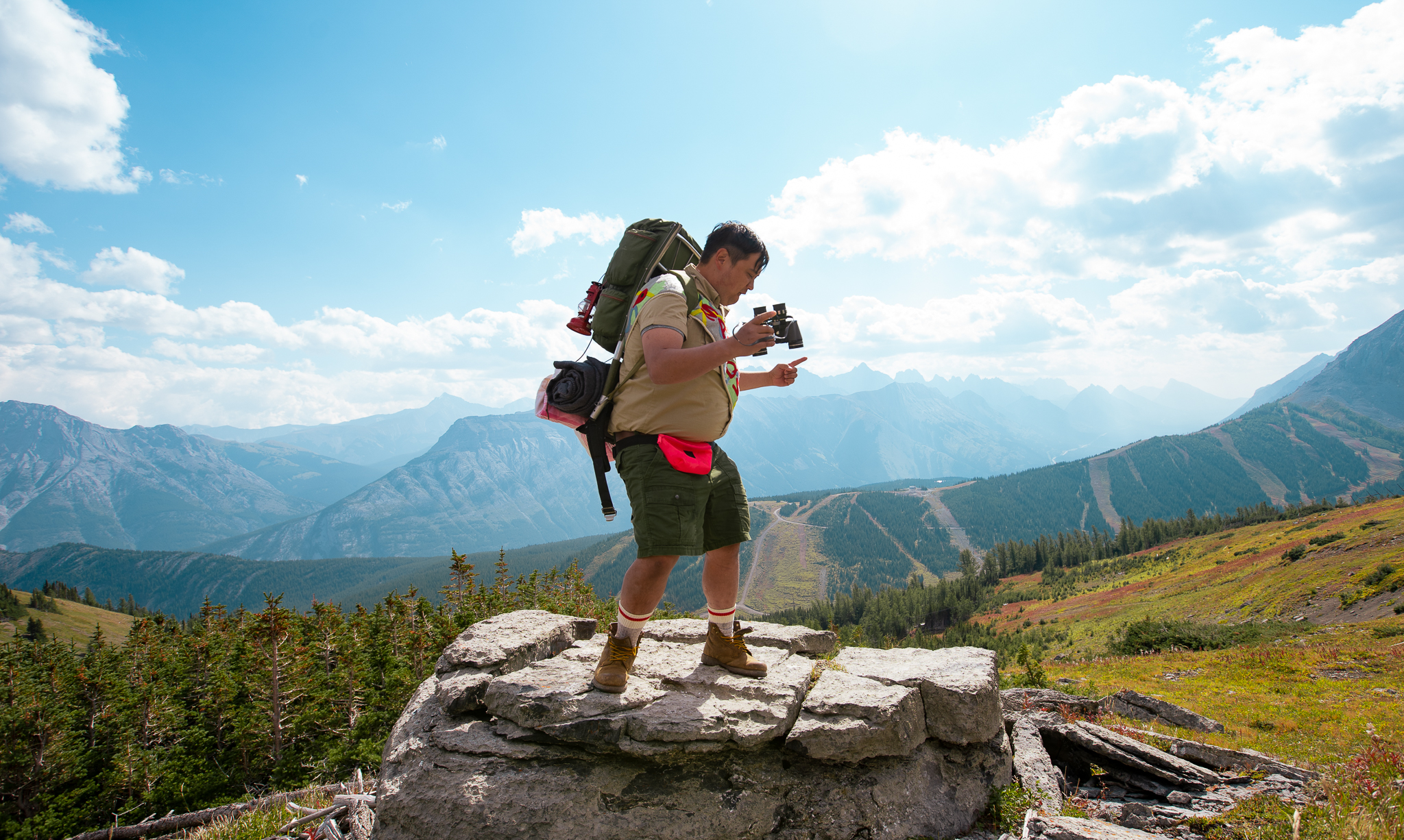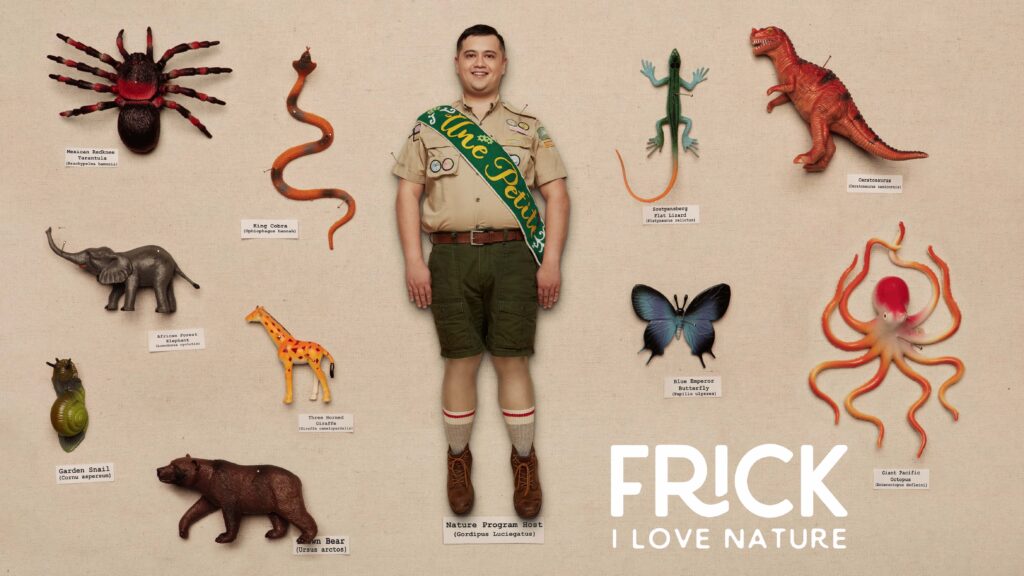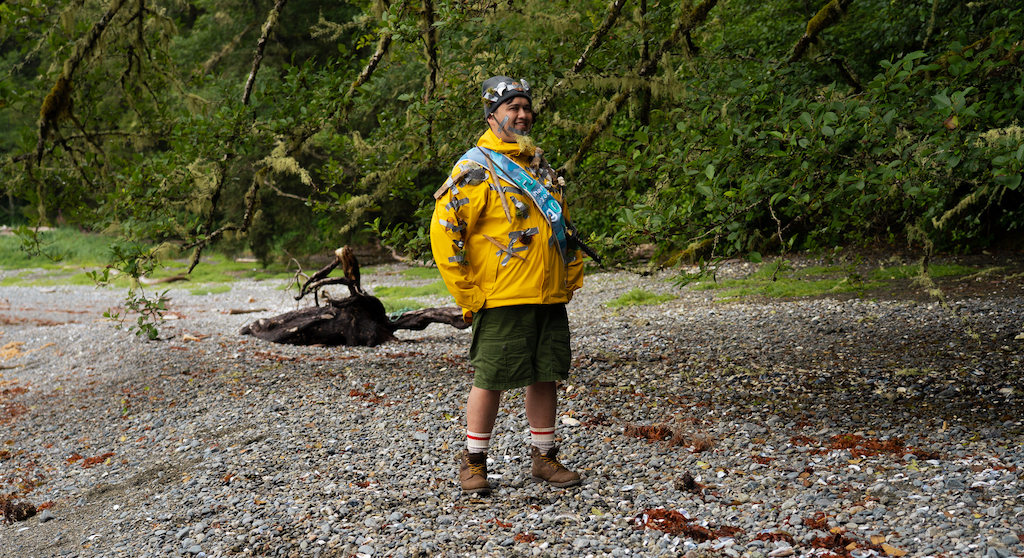Who else enjoys the fantastical happenings and weird events that are in nature? There are so many cool facts about the wilderness that we never really think about. Did you know there’s a fair amount of comedy within nature? I may have seen some funny looking animals in my childhood and had some slightly humourous experiences with real live animals on camping trips (you’re better off not knowing) but I had no idea science facts could be so funny sometimes. CBC’s Frick, I love Nature is a comedy show, of course, about nature, of course. Filmed in Western Canada, the show follows Gordie Lucius as he explores the great outdoors and tells us things I don’t even think I heard in other nature shows as a kid. Then again, I wasn’t highly focused back then so who knows. What better way to do it than with a show that not only includes puppets, but is mainly live action and shows us the quality of the beauty in nature in stunning high quality camera filming? Kind of a refresher from all the 2D and 3D these days if you ask me. I recently spoke to Gordie and the showrunner Stephen Robinson about their crazy good new show and how they found comedy in the wilderness of all things. Maybe I should go out there and see if I can unearth some new film genres, or new content matter even.
HNMAG: It’s an interesting new concept. How did you manage to make a concept about comedy involving wilderness?
Stephen: It’s such a long story about how the show came to be in its current form, but I’ll pack it all together in a 60 second answer. But essentially, my partner and I were out driving on Vancouver Island and I kept saying “Frick, I love nature” whenever I saw the rainforest and such incredible sights on Vancouver Island. After a while of constantly saying this thing, I thought “Oh. That would be a really interesting name for a nature show and it sounds a lot like a nature show but, I’m not funny enough to host this. Who do I know…” and I just recently met Gordie at this other event that we held together and I thought “HE’S a funny guy!” so I sent him a message on Facebook, pitched the idea to him and he was down for it. That was five years ago. It’s been quite the process since then, but we pitched the first season to Telus Storyhive, ended up winning the web series version of that, in 2017. After we finished the first season, we reached out to CBC to see if they’d be interested in taking it to the next level, eventually they said Yes and now we’re here.
HNMAG: It must’ve been quite a process to transfer from a web series to tv series.
Stephen: It was interesting, I think the web series provides a great format to test out ideas and figure out what works and doesn’t work, even from production, writing, and editing standpoints. It really provided a great foundation to pitch to CBC and produce at a higher budget.
HNMAG: Do you two plan to work on other projects together?
Stephen: I would be down.
Gordie: I think we have lots of wild ideas and I think once you get super comfortable working with somebody for so long, it’s just so much easier to say what you think is dumb ideas and it’s so much better to start working from there then for something that you think is perfected or you’re afraid to share with people. Throughout this process, we’ve definitely come up with ideas that we thought were silly and fun. I hope we work together again.
Stephen: We would love to work on other projects together because we’ve developed a really great working relationship. If Frick I love Nature is wildly successful, we’ll look into developing a “Frick I love” universe.
Gordie: I believe I called it the FCU (Frick Cinematic Universe) which is close to another word that we really like.
HNMAG: So where did you learn all of the interesting facts and weird science questions?
Gordie: All over the place. What we did for the show is we worked with a few researchers and anything that people were super excited about, we’d look into that deeper. For instance, Stephen was really excited about learning about ants and I was like, “I don’t like bugs! Bugs scare me.” but we got really determined, he put out the original facts, we dug deeper and deeper, talked to researchers and other specialists about them, you can just amalgamate all this amazing information that is mind boggling. Things you’ve never learned about these animals that you see everyday. We learn facts from any source we can.
HNMAG: Having mentioned your fear of bugs, do you still have issues with them, or do you feel more comfortable given the experiences you’ve went through?
Gordie: Well, I respect the HELL out of bugs. I understand that insects, bugs, arachnids, and ALL sorts of creepy crawly things are essential to how the world works, but that doesn’t mean I want to put my hand in a bucket of ants again (laughs) or have a spider crawl up my face. I’ll DO it, but doesn’t mean I want to do it, but I know that it’s fun and entertaining. But as a kid, being allergic to bees makes you scared of MOST bugs.
Stephen: That’s interesting…
HNMAG: Yeah, it sounds like you have to take some pretty crazy risks when working on an episode.
Gordie: Yeah, there was like four epipens on set and ironically there were three people allergic to bees on set.
Stephen: Yeah, it was really poor planning. It’s usually not in the interview process to ask someone if they’re allergic to bees.
Gordie and Stephen explained they discovered one friend who was allergic to bees and got stung by one when she got home. No telling what else could happen given this was the unpredictability of nature, but at least nobody got hurt.
HNMAG: What would you say are some of the most weirdest and surprising facts you ever learned?
Stephen: One of my favourite facts is the story of how honeybees mate. When a virgin queen is ready to mate, she will fly into the air, and up to 20 drone bees will follow her. These drone bees literally don’t do anything for the hive. They’re the only males in the hive, they don’t clean, they don’t make honey, the just basically hang out and wait until they get to mate. It’s such a sad existence when they finally get to, they explode in such a dramatic event and fall to the ground. I just love it.
Gordie: Wow. What an opus (laughs) One of the amazing facts I’ve learned is that polar bears don’t actually have white fur, it’s actually translucent and hollow which helps keep them really warm.
Stephen: That’s a little gentler, that’s definitely more family friendly nature facts though (laughs)
HNMAG: It’s suggested that there are no stupid questions, especially about nature. But are there some questions or facts you don’t dare try to figure out?
Gordie: For me, there’s always going to be some things that are super hard to figure out but if the fact or the theory that scientists put out is interesting and we think it’s worthy of putting on the show, then make you question things. I don’t think there’s any fact that we’ve come about and found so interesting that we haven’t tried our darnedest to bring to the show.
Stephen: We just try to find the most interesting nature facts and explain them in a way that’s easy for people to understand and entertaining while still being true. As long as we can do that with the different animals we feature, there’s really no place that we won’t go.
Gordie: Yeah, the world is a fascinating place, with all the plants, and fauna. Things will always be changing, and that’s the thing about science fact shows, the world will always be revolving, so many changes, and trying to figure these things out. We are always at the forefront of making sure everything is scientifically correct and if we have anything change, things will always be writing. We’ll learn different facts from all kinds of scientists, and make sure those are put in the show.
HNMAG: And how do you diversify nature programming both behind and in front of the camera? Specifically the stories of animals?
Stephen: Our writing process is mostly research, and taking a ton of time trying to use that research as inspiration to develop ideas for episodes and really drilling down into that so when we have our map figured out for a whole season, we’re really trying to figure out how to have as many interesting topics as possible without overlap. There’s five animals in each episode, and we’ll list those out, and any of those 40 animals that we’re featuring have overlap. It’s really about making those high level decisions early on in the writing process and sticking to that through post-production.
HNMAG: What is the process of production and post-production in a single episode?
Stephen: It starts with research as I’ve said as we’re trying to identify interesting nature facts that aren’t super well known, and then as we do that, we work through writing and then we start talking to experts that we’re going to feature in the show. From there we’re just slowly kind of massaging the writing and the topics back and forth as the research comes in as we source the scripts and talk to the experts. Then the big chunk of filming is when we go out on location and film stuff in nature, have Gordie meet with the experts and interview them. Then we’ll walk around in nature, attempt to climb hills and fail, all that fun stuff. Then once we film that core chunk of the show, then we go into post-production and get a rough cut done of that. Then we kind of decide from there what kind of puppet animations we want to do, and storyboard those all out, film the puppet animations, and then we finish the show form there.
HNMAG: I understand it may be difficult to have filmed outdoors given the pandemic, but was it easier given you were in locations way out in the wilderness where the risk was supposedly minimal?
Stephen: Yeah, we still took precautions and we were still very careful when we were introducing folks into the crew, so it was still a challenge but probably not as difficult as other productions who filmed last summer with a hundred people on sets and were filming indoors.
HNMAG: And when it came to shooting more different locations city-wise, was that difficult to do during the pandemic?
Stephen: Shooting in the city is always more difficult. There’s just more competition for space, and sound. We were really happy when we finished shooting the city animals episode so we could get out into nature.
Gordie: We filmed that first so it was like we were really bustling and hustling, then in nature.
HNMAG: Will there be more episodes to come in the future?
Stephen: We’re hoping that’s the case. We’re chatting with CBC about it currently, but we haven’t had a solid yes or no. Fingers crossed for the next few months that we’ll be able to let the world know they can have more Frick. Right now, we’re focused on getting the episodes out there, to as many people out there in the world to watch it. Hopefully we get more opportunities to make this because we just really love making the show and we have a lot of support from people who’ve seen it so far.
There is a good amount of humour in nature, it seems. They’ve discovered not only cool facts about nature, but a fair amount of funny stuff about nature as well. Here’s hoping they make some more episodes. But in the meantime, take a look at them online now. It’ll feel like you’re in the wilderness yourself. So much cool stuff to learn.



